
Catocala is a generally Holarctic genus of moths in the family Erebidae. The genus was erected by Franz von Paula Schrank in 1802. The moths are commonly known as underwing moths or simply underwings. These terms are sometimes used for a few related moths, but usually – especially when used in plural, not as part of a species name – they are used to refer to Catocala only.

Catocala piatrix, the penitent underwing, is a moth from North America. The species was first described by Augustus Radcliffe Grote in 1864. It is placed in subfamily Catocalinae, either of the family Noctuidae, or – if the Noctuidae are circumscribed more strictly – of family Erebidae. Within the Catocalinae, it belongs to tribe Catocalini and – if the Noctuidae are circumscribed widely – subtribe Catocalina.

Catocala retecta, the yellow-gray underwing, is a moth of the family Erebidae. The species was first described by Augustus Radcliffe Grote in 1872. It can be found in North America from southern Ontario and Quebec south through Maine and New Jersey, south through Tennessee to Georgia and west to Arkansas and Kansas and north to Wisconsin. There is one recognised subspecies, Catocala retecta luctuosa, which is sometimes treated as a valid species with the common name yellow-fringed underwing.

Catocala meskei, or Meske's underwing, is a moth of the family Erebidae. The species was first described by Augustus Radcliffe Grote in 1873. It is found in North America from Maine and Quebec west to southern Alberta and Montana, south to South Carolina in the east and at least Montana in the west.

Catocala whitneyi, or Whitney's underwing, is a moth of the family Erebidae. The species was first described by G. M. Dodge in 1874. It is found in North America from North Dakota, Nebraska, and Kansas eastward through Wisconsin to Ohio and Tennessee. It has also been recorded as far west as Minnesota and Utah. In Canada, it has been found in Manitoba.
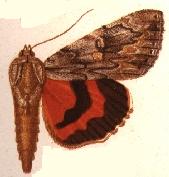
Catocala coccinata, the scarlet underwing, is a moth of the family Erebidae. The species was first described by Augustus Radcliffe Grote in 1872. It is found in southern Canada and the eastern United States, following river valleys onto the Great Plains and down to Florida.

Catocala junctura, the joined underwing or Stretch's underwing, is a moth in the family Erebidae. The species was first described by Francis Walker in 1858. It is found throughout temperate North America, ranging from New York and Pennsylvania west to Montana, Colorado, Oklahoma, Arizona, and into Texas, and north to southern Illinois, extreme southern Alberta and Saskatchewan; it has also been recorded west of the Rocky Mountains from California and south-eastern British Columbia. It is typically found near water, where the food plants of its caterpillar larvae grow plentifully.
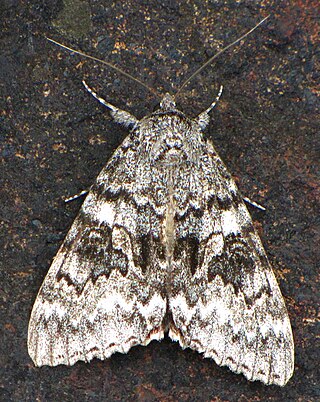
Catocala semirelicta, the semirelict underwing, is a moth of the family Erebidae. The species was first described by Augustus Radcliffe Grote in 1874. It is found in North America from Nevada, Colorado, Utah, California, and Nova Scotia south to Maine, west across Canada to British Columbia, and southward in the mountains.

Catocala judith, or Judith's underwing, is a moth of the family Erebidae. The species was first described by Strecker in 1874. It is found in North America from southern Quebec and Ontario to the United States from New Hampshire south through Connecticut and New Jersey to North Carolina and Georgia, west to Oklahoma and Iowa and north to Wisconsin.

Catocala badia, the bay underwing, bayberry underwing or old maid, is a moth of the family Erebidae. It is found from southern Maine and New Hampshire south to New York and Connecticut.

Catocala flebilis, the mourning underwing, is a moth of the family Erebidae. The species was first described by Augustus Radcliffe Grote in 1872. It is found in North America from Massachusetts and Connecticut south to North Carolina and Georgia, west to Arkansas and north to Michigan and Illinois and into southern Ontario.
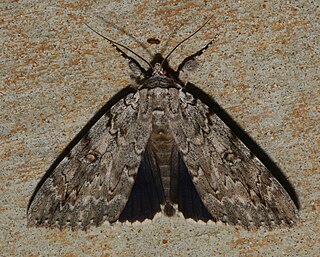
Catocala robinsonii, or Robinson's underwing, is a moth of the family Erebidae. The species was first described by Augustus Radcliffe Grote in 1872. It is found in North America from southern Ontario and New Hampshire south to Florida west to Oklahoma, Missouri and Arkansas and northward to Illinois, Indiana, and Michigan.

Catocala subnata, the youthful underwing, is a moth of the family Erebidae. The species was first described by Augustus Radcliffe Grote in 1864. It is found in North America from Manitoba, Ontario, Quebec, and New Brunswick to Nova Scotia, south through Maine and Connecticut to North Carolina and west to Tennessee, Kentucky, and Texas, then north to Iowa, Wisconsin, and Michigan.
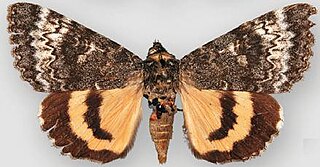
Catocala grotiana, or Grote's underwing, is a moth of the family Erebidae. The species was first described by James S. Bailey in 1879. It is found in the US from Arizona, north through Utah into Colorado. It has also been spotted in Washington and in the western US north and east of California.
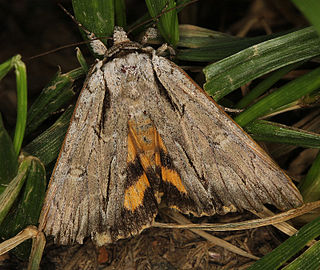
Catocala clintoni, Clinton's underwing, is a moth of the family Erebidae. It is found from Ontario and Quebec, southward to Florida, west to Texas and north to Wisconsin.

Catocala verrilliana, or Verrill's underwing, is a moth of the family Erebidae. The species was first described by Augustus Radcliffe Grote in 1875. It is found in the US from Washington and Oregon to Colorado and south to California, Arizona and Texas, and Cimarron County in western Oklahoma.
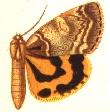
Catocala dulciola, the quiet underwing or sweet underwing, is a moth of the family Erebidae. The species was first described by Augustus Radcliffe Grote in 1881. It is found in the United States from New York through Virginia, west to Missouri and north to Illinois and Michigan.
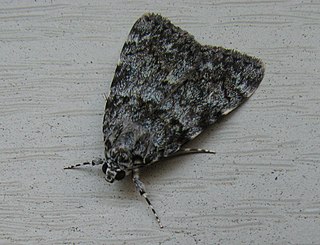
Catocala lineella, the lineella underwing, little lined underwing or steely underwing, is a moth of the family Erebidae. The species was first described by Augustus Radcliffe Grote in 1872. It is found in North America from Ontario and Quebec south to Florida west to Texas and north to Ohio.

Catocala mira, the wonderful underwing, is a moth of the family Erebidae. The species was first described by Augustus Radcliffe Grote in 1876. It is found in North America from Manitoba through southern Ontario and Quebec through New Hampshire and Connecticut to Florida, west to Texas and north through Iowa and Illinois.

Catocala sordida, the sordid underwing, is a moth of the family Erebidae. The species was first described by Augustus Radcliffe Grote in 1877. It is found in North America from Saskatchewan east to New Brunswick and Prince Edward Island and south through Maine and Connecticut to Florida, west to Texas and north to Manitoba.














